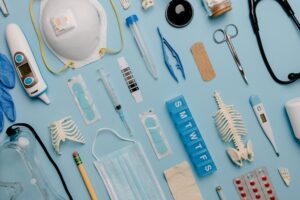Infectious diseases are the second leading cause of death, responsible for more than 170,000 deaths each year in the United States. Infectious disease doctors gain a leading edge in the healthcare industry after the COVID-19 pandemic. Many medical students are not aware of the infectious disease specialty and the career opportunities the specialty has in store for them.
Infectious disease doctors are experts that specialize in identifying infection causing pathogens and treating conditions caused by microorganisms such as bacteria, virus, COVID-19, fungi and protozoa.
There are a number of infectious diseases, from coronavirus to flu, pneumonia, and common cold. With their strong clinical and laboratory skills, infectious disease doctors can make the right diagnosis and create the best treatment plan.
Becoming an ID specialist is a great career choice as it prepares medical students for different career opportunities. Choosing an infectious disease medical specialty and becoming a board-certified MD physician is a long journey. Let’s discover what infectious diseases doctors do, what are their career opportunities, education and training requirements and sub-specialties options.
What Do Infectious Disease Specialists Treat?
Infectious disease doctors treat a myriad array of acute and chronic infectious diseases, including
- Coronavirus
- HIV
- Hepatitis
- MRSA or Norovirus
- Pneumonia
- Bone infections
- Dengue
- Malaria
- Cholera
- Ebola
Infectious disease is a dynamic specialty that combines clinical and laboratory practice. Since ID specialists see patients with acute and chronic conditions, they will get the opportunity to work with inpatient and outpatient hospital settings. In order to treat a wide variety of diseases, aspiring infectious disease doctors must hone their clinical and laboratory skills to create the right diagnosis and treatment plan.
Infectious diseases doctors order blood tests and other body fluids to check the antibodies and identify what type of infection is present. Infectious diseases doctors also recommend vaccination to prevent the disease.
Education and Training Requirements
The path to becoming an Infectious disease doctor is long, it usually takes 10 years of hard work, continuous training and a lot of work. You need to get accepted to the best medical school. This requires completion of prerequisite courses, volunteering, shadowing, research and much more.
Once you get an MD degree, you are required to complete a three-year training residency in internal medicine or in specialized fields such as microbiology. After completing your internal medicine residency and successfully passing internal medicine board examinations, you need to complete a two to three-year training fellowship in infectious diseases.
Infectious Disease Subspecialties
Medical students have a number of subspeciality choices available to choose from. After completion of a two-year infectious disease fellowship training program, medical students can receive specialized training in the following subspecialities.
- HIV/AIDS
- Hepatitis
- Malaria
- Public Health
- Pediatric Infectious Disease
- Tuberculosis
- Transplant Infectious Disease
- General internal medicine
- Medical microbiology
- Virology
- Tropical medicine
Why Choose a Career in Infectious Disease?
Choosing a career in infectious disease prepares you for a lot of diverse roles. As an ID specialist, you are responsible to perform a detailed physical exam and carefully review medical data. Based on the patient’s symptoms, ID specialists order blood tests, urine tests, stool samples, imaging scans, tissue biopsies, throat swabs, depending on the patient’s medical condition.
To create the right diagnosis and treatment plan, infectious disease specialists consult with other physicians, such as pulmonologists, and dermatologists. Infectious disease doctors identify the cause of disease. Whether it is an antibiotic resistant infection, high or unexplained fever, or chronic infectious disease, infectious disease doctors can diagnose and treat many complex diseases.
Career Opportunities for Infectious Disease Doctors
Gaining specialized training in infectious diseases will prepare you for many lucrative career opportunities in different healthcare fields.
Health Care Epidemiology
As an ID specialist, you can work in the field of health care epidemiology. You will be responsible for improving the quality of patients’ lives and ensure maximum safety of healthcare workers. As pharmaceutical companies and drug manufacturers are developing more and more anti-infective agents and vaccines. It will eventually increase the chances of more job openings for infectious disease specialists.
Academic Medicine
Infectious disease doctors can get different career opportunities in medical schools and hospitals. For instance, they can pursue careers in research, teaching, and administration.
Private Practice
As an infectious disease specialist, you can focus on private clinical practice and get the opportunity to work in outpatient and outpatient settings. You will be responsible for infection control, antibiotic formula selection, and control of infectious disease issues.
Global Health Careers
ID physicians and researchers play an important role in improving global health. Many ID specialists play a key role in COVID-19 treatment. They can provide the best possible care to Coronavirus infected patients. ID specialists take part in clinical research and find the best treatment options and vaccines to control contagious diseases and prevent disease outbreaks.
Final Note
Infectious disease is an interesting specialty that combines clinical and laboratory practice. Gaining specialized training in this medical field will prepare you for many lucrative career opportunities in different hospital settings and medical schools. If you have made up your mind, apply to medical school and fulfill your dream of becoming an infectious disease doctor.






